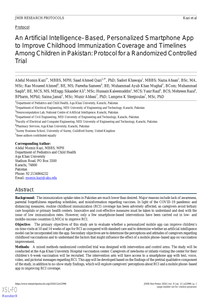Dit artikel ‘Project 2.0: Coronamelder’ is verschenen als een hoofstuk in het boek: Multidisciplinaire aspecten van COVID-19 apps door Natascha van Duuren, Victor de Pous (redactie), Uitgeverij DeLex, 2021. Het boek bevat zelfstandige hoofdstukken die ieder een ander aspect beschrijven van de inzet van apps om COVID-19 te bestrijden. In het hoofdstuk ‘Project 2.0: CoronaMelder’ wordt de architectuur en ontwikkeling van de Nederlandse Covid-19 app beschreven aan de hand van de gepubliceerde documentatie en broncode.
DOCUMENT
Background: The immunization uptake rates in Pakistan are much lower than desired. Major reasons include lack of awareness, parental forgetfulness regarding schedules, and misinformation regarding vaccines. In light of the COVID-19 pandemic and distancing measures, routine childhood immunization (RCI) coverage has been adversely affected, as caregivers avoid tertiary care hospitals or primary health centers. Innovative and cost-effective measures must be taken to understand and deal with the issue of low immunization rates. However, only a few smartphone-based interventions have been carried out in low- and middle-income countries (LMICs) to improve RCI. Objective: The primary objectives of this study are to evaluate whether a personalized mobile app can improve children’s on-time visits at 10 and 14 weeks of age for RCI as compared with standard care and to determine whether an artificial intelligence model can be incorporated into the app. Secondary objectives are to determine the perceptions and attitudes of caregivers regarding childhood vaccinations and to understand the factors that might influence the effect of a mobile phone–based app on vaccination improvement. Methods: A mixed methods randomized controlled trial was designed with intervention and control arms. The study will be conducted at the Aga Khan University Hospital vaccination center. Caregivers of newborns or infants visiting the center for their children’s 6-week vaccination will be recruited. The intervention arm will have access to a smartphone app with text, voice, video, and pictorial messages regarding RCI. This app will be developed based on the findings of the pretrial qualitative component of the study, in addition to no-show study findings, which will explore caregivers’ perceptions about RCI and a mobile phone–based app in improving RCI coverage. Results: Pretrial qualitative in-depth interviews were conducted in February 2020. Enrollment of study participants for the randomized controlled trial is in process. Study exit interviews will be conducted at the 14-week immunization visits, provided the caregivers visit the immunization facility at that time, or over the phone when the children are 18 weeks of age. Conclusions: This study will generate useful insights into the feasibility, acceptability, and usability of an Android-based smartphone app for improving RCI in Pakistan and in LMICs.
DOCUMENT

This white paper is presented by the Ethics Working Group of the uNLock Consortium This white paper presents findings of the Ethics Working Group, from the conceptual phase of investigation into the ethical issues of the uNLock solution, providing identity management solutions for sharing and presentation of medical COVID-19 credentials (test results) in the context of healthcare institutions. We have provided an outline of direct and indirect stakeholders for the uNLock solution and mapped values, benefits, and harms to the respective stakeholders. The resulting conceptual framework has allowed us to lay down key norms and principles of Self Sovereign Identity (SSI) in the specific context of uNLock solution. We hope that adherence to these norms and principles could serve as a groundwork for anticipatory mitigation of moral risk and hazards stemming from the implementation of uNLock solution and similar solutions. Our findings suggest that even early stage of conceptual investigation in the framework of Value Sensitive Design (VSD), reveals numerous ethical issues. The proposed implementation of the uNLock app in the healthcare context did not proceed further than prototype stage, thus our investigation was limited to the conceptual stage, and did not involve the practical implementation of VSD method involving translation of norms and values into engineering requirements. Nevertheless, our findings suggest that the implementation of VSD method in this context is a promising approach that helps to identify moral conflicts and risks at a very early stage of technological development of SSI solutions. Furthermore, we would like to stress that in the light of our findings it became painfully obvious that hasty implementation of medical credentials system without thorough ethical assessment, risks creating more ethical issues rather than addressing existing ones.
DOCUMENT
